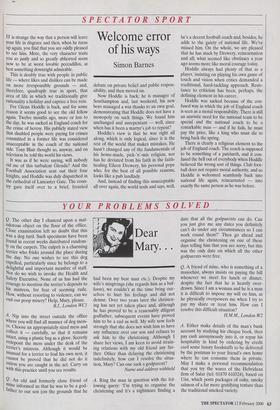SPECTATOR SPORT
Welcome error of his ways
Simon Barnes
IT is strange the way that a person will leave your life in disgrace and then, when he turns up again, you find that you are oddly pleased to see him. More, the very character traits you so justly and so greatly abhorred seem now to be at worst lovable peccadillos, at best something downright. admirable.
This is doubly true with people in public life — where likes and dislikes can be made on more irresponsible grounds — and, therefore, quadruply true in sport, that area of life in which we traditionally give rationality a holiday and caprice a free rein.
For Glenn Hoddle is back, and for some reason it seems good to see the old fellow again. Twelve months ago, more or less to the day, he was sacked as England coach for the crime of heresy. His publicly stated view that disabled people were paying for crimes committed in a former life was considered unacceptable in the coach of the national side. Tony Blair thought so, anyway, and on television he told the world his views.
It was as if he were saying, will nobody rid me of this turbulent Glenda? And the Football Association sent out their four knights, and Hoddle was duly dispatched in the cathedral of Lancaster Gate. The coun- try gave itself over to a brief, frenzied debate on private belief and public respon- sibility, and then moved on.
Now Hoddle is back; he is manager of Southampton and, last weekend, his new boys managed a win thanks to an own goal, demonstrating that Hoddle does not have a monopoly on such things. We found him unchanged and unrepentant — well, since when has it been a martyr's job to repent? Hoddle's view is that he was right all along, which is only logical, since it is the rest of the world that makes mistakes. He hasn't changed any of the fundamentals of his home-made, pick-'n'-mix religion, nor has he deviated from his faith in the faith- healing Eileen Drewery, his personal pope who, for the best of all possible reasons, looks like a pub landlady. And, instead of finding this unacceptable all over again, the world nods and says, well, he's a decent football coach and, besides, he adds to the gaiety of national life. We've missed him. On the whole, we are pleased that he has stuck by Drewery, reincarnation and all; what seemed like obstinacy a year ago seems more like moral courage today.
Hoddle always had plenty of that as a player, insisting on playing his own game of touch and vision when critics demanded a traditional, hard-tackling approach. Resis- tance to criticism has been, perhaps, the defining element in his career.
Hoddle was sacked because of the con- fused way in which the job of England coach is seen as a moral responsibility. There is still an atavistic need for the national team to be special and the, national coach to be a remarkable man — and if he fails, he must pay the price, like a king who must die to bring back the spring.
There is clearly a religious element to the job of England coach. The coach is supposed to be something of a patriarch, and it con- fused the hell out of everybody when Hoddle believed the wrong sort of things. Club foot- ball does not require moral authority, and so Hoddle is welcomed seamlessly back into national life again, reincarnated — into exactly the same person as he was before.


































































 Previous page
Previous page